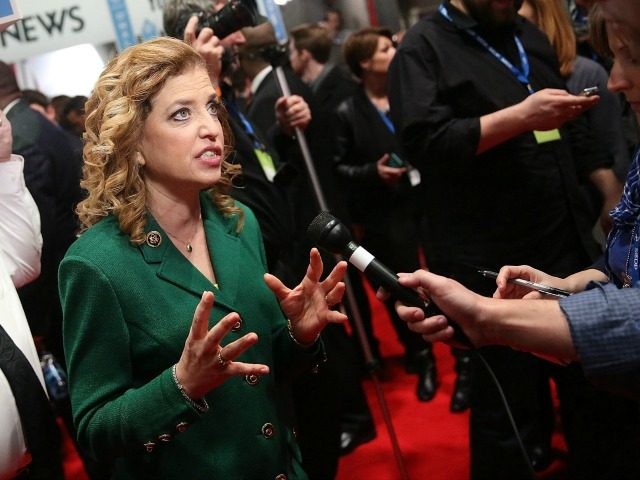Bernie Sanders is openly opposing the Democrat establishment.
Sanders, who’s continuing an uphill fight against frontrunner Hillary Clinton for the nomination, let it be known that he would be fundraising for the primary challenger to DNC Chief Rep. Debbie Wasserman Schultz.
In an email to supporters, Sanders’ campaign manager Jeff Weaver asked recipients to split a donation between Sanders and Tim Canova, primary opponent to Rep. Wasserman Schultz in her congressional district in Florida. Wasserman Schultz is defending her north Miami district in the state’s August 30 primary, taking place just a few weeks after the DNC Convention in Philadelphia.
Sanders’ aggressive campaigning for the sitting congresswoman’s opponent is unprecedented in the middle of an ongoing Presidential primary. Canova has already raised over $1 million since entering the race, largely on the small-dollar fundraising appeals that have fueled Sanders’ insurgent bid for the Democrat nomination.
Sanders has sparred with Wasserman Schultz, and her leadership of the DNC, throughout the primary campaign. He has criticized her handling of the primary debate schedule, claiming that she had designed it to benefit frontrunner Clinton.
Sanders has also criticized the Democrat primary contest itself as well as the party’s reliance on so-called “superdelegates” to select the nominee. Around 15 percent of the total number of Democrat delegates are comprised of superdelegates, elected Democrat office holders and party insiders who each have an individual vote at the convention. These superdelegates make their vote independent of how their state or districts votes in the Presidential primary contests.
Hillary Clinton has the overwhelming backing of this special class of delegates and is likely to clinch the nomination on their support in Philadelphia. Sanders’ tenacious fight in the primary and his recent string of victories make it increasingly unlikely that Clinton can secure the nomination on the votes of delegates won through state primary and caucus votes alone.
While the Republican party is steadily uniting behind its presumptive nominee, Donald Trump, the Democrat primary is becoming increasingly acrimonious. Sanders’ open campaigning against Wasserman Schultz for her political day-job suggests that the challenger is gearing up for a fight with the party’s national establishment.
The conflict between Sanders’ grass roots supporters and the Democrat party establishment boiled over a week ago at a party convention in Nevada. Sanders’ supporters loudly protested during the proceedings over rules they said unfairly benefited Clinton.
The heated debate in Nevada is a preview of what could unfold in Philadelphia. Sanders’ strong finish in the Democrat campaign means that Clinton will likely need the votes of superdelegates to secure her the nomination. Sanders has amassed enough pledged delegates, however, that if superdelegates swung their support behind him, he could secure the party’s nomination.
The optics for Democrats, just three months before the general election, could hardly be worse for the party. In the view of Sanders’ supporters, “party insiders” will deliver the nomination for Hillary Clinton. It will cap-off growing complaints that the Democrat primary process is “rigged” on behalf of candidates selected by the party establishment.
The Democrat party risks a replay of the 1968 convention, when party insiders swept aside anti-Vietnam War candidates popular with young activists in favor of establishment candidate Hubert Humphrey. Democrats went on to lose in landslide against Republican Richard Nixon.
Sanders is a similar candidate to those that galvanized young voters in 1968. He is a “movement” candidate who has built a formidable, and unlikely, campaign infrastructure that has captured around half of the state primary and caucus contests. He is likely to close out the campaign in June with another string of victories and a trove of additional delegates.
Sanders is also helped by general election polling that shows him currently a stronger challenger to Trump than Hillary Clinton. He has a stronger “electability” argument that the establishment favorite, Hillary Clinton, who is suffering from terrible personal polling numbers.
For many Democrat activists, then, Sanders isn’t simply a better ideological fit but also a more credible standard-bearer for the party going into November. Movement supporters can be persuaded, on the margin, that an establishment pick offers the best chance of victory in a general election. That is perhaps not true in this case, however. For many Sanders’ supporters, there is simply no reason to select Clinton as the nominee, other than the desires of an out-of-touch party establishment.
For months, Democrats savored the competitive fighting in the Republican primary process, confident that they would present a united front in November. Hopes of a Republican party crack-up have dimmed, however, as Trump makes clear strides in uniting the GOP behind his insurgency.
At the same time, open civil war is now looming for the Democrats. The debate within the party is getting personal too. Sanders has said in the past he would replace Wasserman Schultz as DNC Chair if he were to become the nominee. That was blunt talk concerning a possibility that isn’t really unusual. A party’s nominee often controls the titular head of the party.
Sanders now, though, is going after Wasserman Schultz’s actual political office in the House. He doesn’t just want her out of the Democrat party hierarchy. He wants her out of politics completely.
The growing Democrat party rift isn’t going to heal anytime soon.

COMMENTS
Please let us know if you're having issues with commenting.